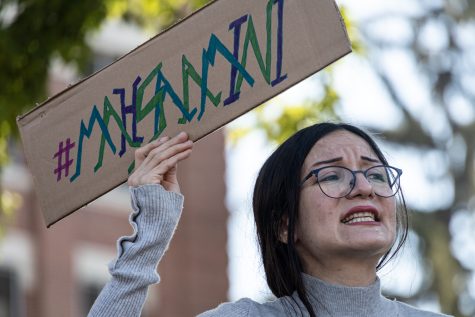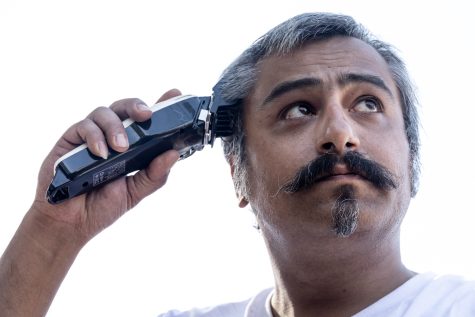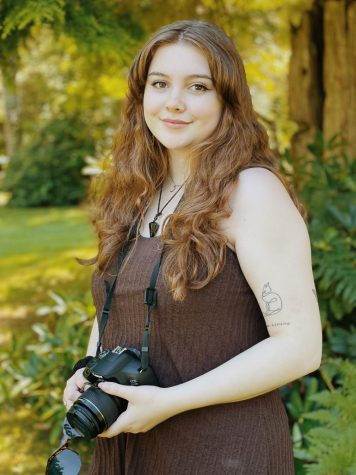‘Say her name, Mahsa Amini’
WSU students participate in demonstration in part of protests in Iran
September 27, 2022
Editor’s Note, Oct. 2, 2023: Two sources in this article has since asked for their name and image to be removed and remain anonymous for their own safety, their quotes remain in the article under the pseudonym Jane Doe and John Doe.
Story has been corrected on Sept. 28.
Jane Doe, vice president of the Iranian Student Association, was in Iran when she was arrested for her shirt being too short. She was pushed into a van with other young girls and was forced to take mug shots.
“Please let me go I am afraid,” Jane Doe said.
They responded, “If you do not take this picture, you will not be free.”
It is common in Iran to have encounters like this with the so-called morality police, according to CNN. Women and men struggle every day to meet the expectations of the Iranian Regime and live out of fear of retaliation.
“The regime has been doing all this for 40-something years of taking the government. She [Mahsa Amini] is one of millions that had been killed, executed, murdered, by the regime,” said Rose Maleki, WSU equity education assistant.
On Sept.13, Amini was arrested and beaten by morality police for not wearing her hijab correctly because she had a few strands of hair slip through her hijab. She was in a coma and eventually died from her injuries.
Killings from the police have been increasingly frequent throughout the years in Iran, and after the death of Amini “enough was enough,” Jane Doe said.
The police dispute the fact they had anything to do with her death and continue to reject their involvement, saying she had a heart attack.
“These days they are killing more women because our sisters, mothers, grandmothers are in the streets and they are fighting with police and the police is killing them to let them know they didn’t kill the other girl,” Jane Doe said.

Demonstrator holding up a sign that says #Mahsaamini outside Terrell Mall Sept.27.
Roughly 76 people have been reported dead from the ongoing protests over the last week. Many more are missing, and families are worried because there is no way to contact them, Amir Moadab, graduate student finance and management science major, said.
“This is our reality,” Maleki said.
A protester named Hadees Najafi was in a viral video, where she is seen tying her hair up before she joined the protest. She was later shot several times by police.
Virtual private networks are no longer working, and students have to change them every five minutes in order to contact family back in Iran, Maleki said. VPNs mask IP addresses, creating a private connection from a public Wi-Fi connection.
“They shut down the internet because they don’t want the world to know about the genocide that they are doing now. They are killing people in the street and just because they are asking for their basic human rights,” Jane Doe said.
Jane Doe, Iranian Student Association president, wanted to support Iranians by spreading awareness here at Terrell Mall on Tuesday.
The demonstration had people chanting “Women’s lives matter,” “Humans rights matter” and “Down with Khamenei,” who is the supreme leader of the Islamic regime.
A group of women at the demonstration tied up their hair in solidarity with Najafi.
Maryam Edrisi, evolutionary anthropology graduate, and Jane Doe later started to cut their hair in protest alongside others around the world in solidarity with Amini who was killed over her hair being out of her hijab.
Cutting their hair is also a Kurdish tradition to mourn a lost one, John Doe said.

Demonstrator cuts their hair on Sept. 27. in Kurdish tradition to honor lost ones as well as solidarity with Mahsa Amini.
“It’s not only women, it’s everyone’s rights. My brother was in jail for two days simply because he had long hair. My sister had to stay in jail for one night simply because she was sitting next to one of her male classmates,” Maleki said.
Iranian migrants in the U.S. are demonstrating their anger by standing by their brothers and sisters away from home, Maleki said.
“If my brother is in prison, I am not free. If my sister is arrested for her hair blowing in the wind, I am not free,” Moadab said.
People can support the fight by spreading the #MahsaAmini on Twitter and social media to help spread awareness, Jane Doe said.
Spreading awareness and advocating for women’s rights is what people can do to support each other at this time.
Amini’s name became a symbol and code for protestors in Iran, allowing them to use the hashtag to connect with other advocates and spread the word, Jane Doe said.
“For today, we just want to spread the word and we want to make awareness to what is happening in Iran, and we want to ask people over here if you care, please fight for women,” Jane Doe said.









